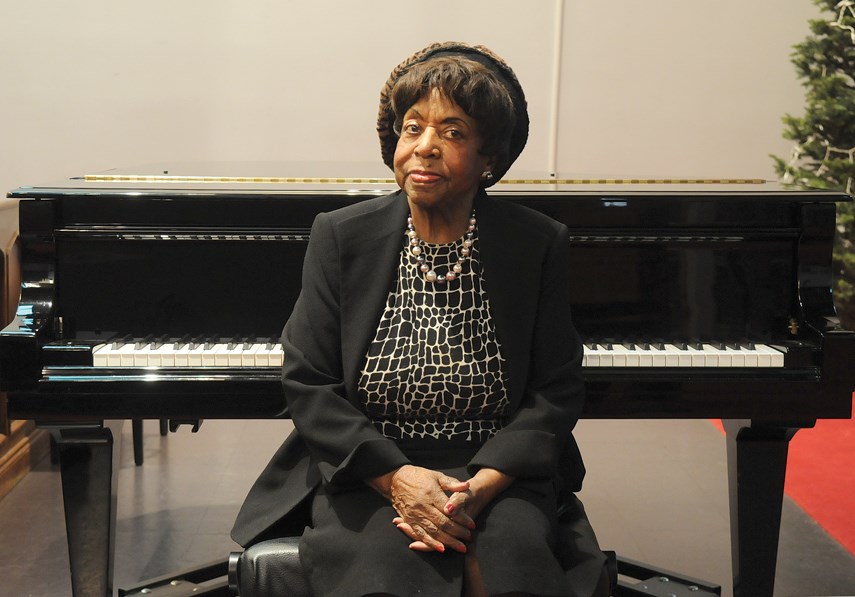Jazz Vespers: Ada Lee accompanied by the Ron Johnson Quartet, St. Stephen’s Anglican Church, West Vancouver, Sunday, Jan. 6 at 4 p.m. Admission by donation. For more information visit ststephenschurch.ca.
Ada Lee needs a cane today.
Now 91, she hurt her leg recently and said “a few Sunday school words,” she confides as she walks to church in three-quarter time.
Moving into St. Stephen’s Anglican Church she sees the piano and picks up the step-step-tap tempo, heading down the aisle like a bride with a plane to catch.
She moves toward the instrument like it’s been waiting for her.
“What kind of piano is this?” she asks, more to herself than anyone in the room. Having shared ivories with Duke Ellington, Count Basie and Oliver Jones, Lee knows what a piano can do.
“It’s locked,” her friend and collaborator Peter Vanderhorst informs her.
“Open it,” she orders.
Lee is funny but she’s not joking. Vanderhorst produces a key.
Her small hands make a few runs over the piano; casually, easily. She’s not really playing yet, she’s auditioning the keys.
“Not bad.”
Notes turn into phrases. She must be trying but the effort is nowhere in sight as the phrases become a melody.
“You want the truth? It’s a pretty good piano,” she says.
Lee is about as likable as a person can be. Vanderhorst grins when describing the time she told him – lovingly – to “shut up” shortly before rocking the house with a singalong version of “This Little Light of Mine.”
“We got a standing ovation and I’m figuring, ‘Why don’t they say Amen?’” Lee muses.
She starts playing “Fly Me to the Moon.” She plays “in other words” and then drifts from the melody, teasing the hastily assembled audience of three before finishing with: “I, love, you.”
The music unearths memories and Lee finds herself thinking about John Coltrane.
“His favourite song, you know, was ‘Greensleeves.’”
She sounds like she’s talking about someone she knew. Because, of course, she is.
She’d opened for Coltrane at the Blue Angel nightclub in New York when he took the stage and started playing “Greensleeves,” she recalls.
She changed her clothes and went downstairs to get a bite to eat.
“We’re down there at least an hour or more. When we get back, he’s still playing ‘Greensleeves!’” she laughs.
“Coltrane could,” she adds.
Lee can tell you what brand of baby powder pianist Oliver Jones used to sprinkle over the keys. “He was a fast runner,” she explains, playing a little in his style. “Duke Ellington couldn’t touch him.”
She also opened for Ellington at the Apollo Theatre, crooning in a dress of gold, green and Chantilly lace that, as she told a Toronto Star reporter, was “so tight you couldn’t hide a matchstick in it.”
Lee is the connective tissue from that era of Ella, Nina and Lena, Billy Eckstine, Billie Holiday, Bird, “Skylark,” Coltrane, “Midnight Train,” hard bop, hot air, the Birth of the Cool.
Like a knight adhering to a chivalric code while castles crumble, Lee is an exemplar of the jazz age.
“The music today is not . . . there’s no depth.”
Once described by the Toronto Blues Society as “small-framed yet . . . bigger than life,” Lee seems to contract for a moment as she remembers all the musicians who moved her and shaped her. The music stops and St. Stephen’s goes quiet.
“You have no idea,” she says quietly. “Coming out here makes me go back mentally, musically.”
She’s just returned from a funeral, she says. One of many.
“I lost five great friends one right after another. I lost two brothers one right after another,” she says.
For a moment, the burden of surviving seems like too much. But she’s still here, she notes.
“What’s that old saying? Somebody up there likes me,”
She laughs and the music comes back. The piano conjures up more memories.
Growing up in Springfield, Ohio. Formulating, then abandoning, her ambition to be a nun.
There was her first instrument, a flute. She fainted the first time she played it, she says.
Then there was meeting Pierre Trudeau, tapping her cheek and telling him: “Well, if it won’t shake up Parliament, you can put it right there.”
“Parliament’s already shook,” the prime minister replied.
Lee laughs. “I’m waiting to meet Justin.”
She remembers touring with Count Basie and his band members playing craps in the aisle of the bus.
They had a white driver, she recalls.
“We had to send the white driver in to get our order because they didn’t want any black people in their restaurant,” she says. “That I couldn’t understand.”
Besides its obvious horrors, there’s something incomprehensible about racism, Lee finds.
“I asked people . . . what is the reason you don’t like me?”
Later, she plans to head back to her church in Vancouver’s West End. Their piano is wonderful, she says.
“I feel like I’m home when I’m there,” she says.
Having lived in Ontario for half a century, Vancouver is taking some getting used to.
“I have never so many Porsche automobiles on the streets in all my life. But then I’ll go around the corner I’ll see a guy pushing (a shopping cart) and he’s got everything he owns in his life,” she says.
“I’m finding my way in here, in Vancouver because this is where I’m going to be leaving.”
She has 11 doctors, she says, recounting a disagreement with her ophthalmologist.
Eye treatments will be better someday, she told him, and that’s when she’ll let him work on her bad eye.
The doctor told her she might not be here.
“I said, ‘I may not be here but you’ll be thinking about me.’”



